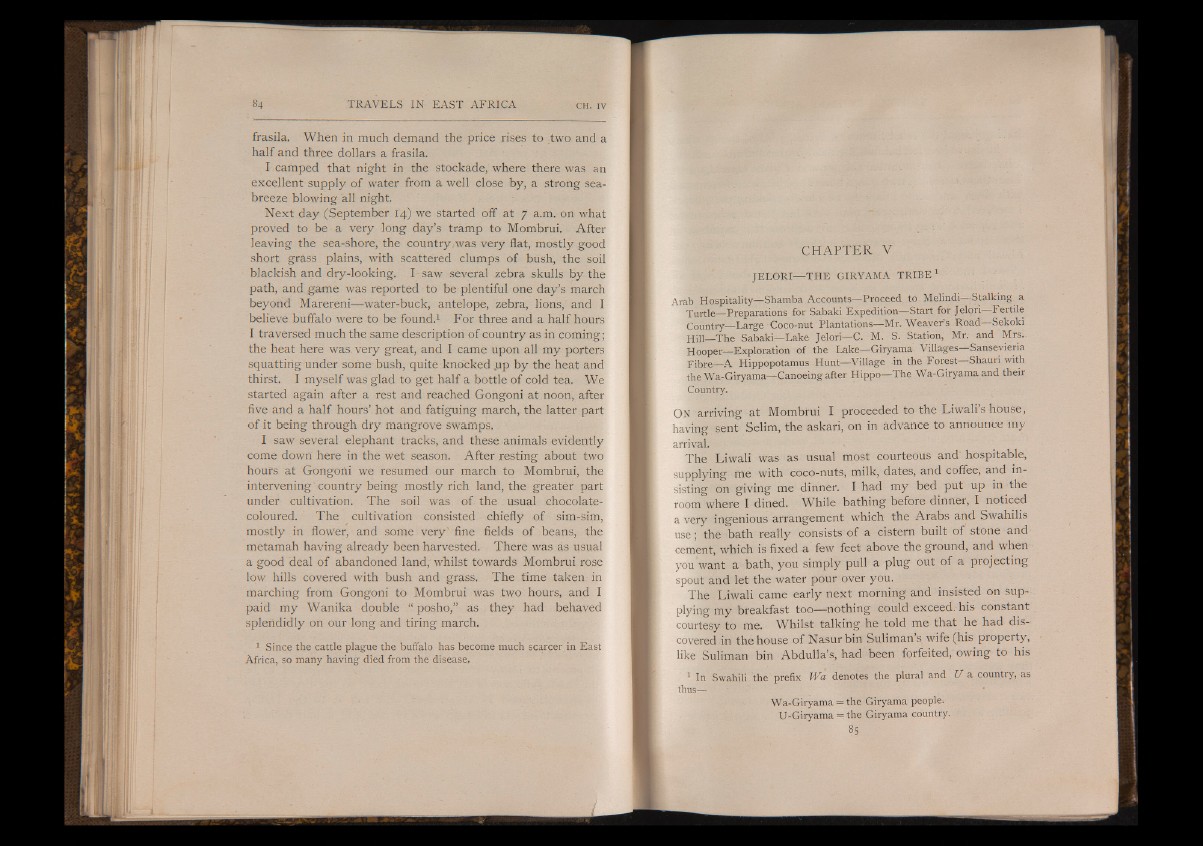
frasila. When in much demand the price rises to two and a
half and three dollars a frasila.
I camped that night in the stockade, where there was an
excellent supply of water from a well close by, a strong sea-
breeze blowing all night.
Next day (September 14) we started off at 7 a.m. on what
proved to be a very long day’s tramp to Mombrui. After
leaving the sea-shore, the country was very flat, mostly good
short grass plains, with scattered clumps of bush, the soil
blackish and dry-looking. I-saw several zebra skulls by the
path, and game was reported to be plentiful one day’s march
beyond Marereni— water-buck, antelope, zebra, lions, and I
believe buffalo were to be found.1 For three and a half hours
I traversed much the same description of country as in coming;
the heat here was. very great, and I came upon all my porters
squatting under some bush, quite knocked .up by the heat and
thirst, I myself was glad to get half a bottle of cold tea. We
started again after a rest and reached Gongoni at noon, after
five and a half hours’ hot and fatiguing march, the lat-ter part
of it being through dry mangrove swamps.
I saw several elephant tracks, and these animals evidently
come down here in the wet season. After resting about two
hours at Gongoni we resumed our march to Mombrui, the
intervening' country being mostly rich land, the greater part
under cultivation. The soil was of th e ; usual chocolate-
coloured. The cultivation consisted chiefly of sim-sim,
mostly in flower, and some very' fine fields of beans, the
metamah having already been harvested. There was as usual
a good deal of abandoned land, whilst towards Mombrui rose
low hills covered with bush and grass. The time taken in
marching from Gongoni to Mombrui was two hours, and I
paid my Wanika double “ posho,” as they had behaved
splendidly on our long and tiring march.
1 Since the cattle plague the buffalo has become much scarcer in East
Africa, so many having died from the disease,
CH A P T ER V
JELORI— THE GIRYAMA TRIBE 1
Arab Hospitality—-Shamba Accounts— Proceed to Mehndi— Stalking a
Turtle— Preparations for Sabaki Expedition— Start for Jelori Fertile
Country— Large Coco-nut Plantations— Mr. Weaver’s Road Sekoki
Hill— The Sabaki— Lake Jelori— C. M. S. Station, Mr. and Mrs..
Hooper— Exploration of the Lake— Giryama Villages Sansevieria
Fibre— A Hippopotamus Hunt— Village in the Forest Shauri with
the Wa-Giryama— Canoeing after Hippo— The Wa-Giryama and their
Country.
ON arriving at Mombrui I proceeded to the Liwali’s house,
having sent Selim, the askari, on in advance to announce my
arrival. -
The Liwali was as usual most courteous and'hospitable,
supplying me with coco-nuts, milk, dates, and coffee, and insisting
on giving me dinner. I had my bed put up in the
room where I dined. While bathing before dinner, I noticed
a very ingenious arrangement which the Arabs and Swahilis
use; the bath really consists of a cistern built of stone and
cement, which is fixed a few feet above the ground, and when
you want a bath, you simply pull a plug out of a projecting
spout and let the water pour over you.
The Liwali came early next morning and insisted on supplying
my breakfast too— nothing could exceed, his constant
courtesy to me. Whilst talking he told me that he had discovered
in the house of Nasur bin Suliman’s wife (his property,
like Suliman bin Abdulla’s, had been forfeited,'owing to his
1 In Swahili the prefix Wa denotes the plural and U a country, -as
thus—
Wa-Giryama = the Giryama people,
U-Giryama = the Giryama country.